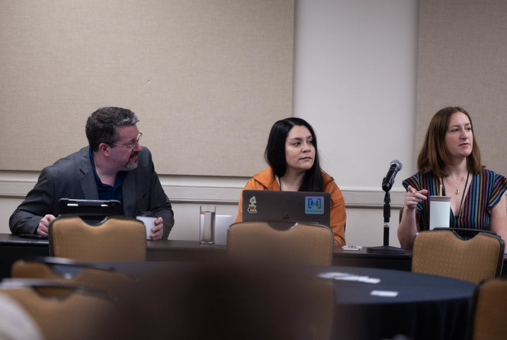
Digital media outlets CIPER (Chile), Agência Pública (Brazil) and La Antígona (Peru) have innovative financing models involving their audiences that have allowed them simultaneously to support themselves financially and strengthen their bonds with readers. These media shared 10 strategies to optimize reader contributions.

Wendi C. Thomas, founding editor and publisher of nonprofit newspaper MLK50: Justice through Journalism, created a newsroom that centered “people traditionally pushed to the margins.” During her keynote session at the 25th International Symposium on Online Journalism (ISOJ), on April 12, Thomas told that story.

If there is one topic that journalists should talk more about, it is money. That is why on the first day of the 25th International Symposium on Online Journalism (ISOJ), the lunch hour was used to talk about strategies to optimize revenue for local media.

Meredith Kopit Levien, president and CEO of The New York Times Company, has worked for years on the sustainability of quality journalism. In her ISOJ keynote session, she summarizes the most important aspects that the outlet has prioritized in the pursuit of a sustainable business model.

As communities grow and newsrooms shrink across the country, publications must find increasingly creative ways to inform the public. At ISOJ, leaders in journalism product development led a workshop with journalists from across the country to discuss meeting the public’s needs while innovating how news is spread.

With national reach and without equivalent in the country, Continente and Pernambuco magazines have recently undergone renovations. Financed by a publisher that belongs to the Pernambuco state government, the publications, which are 24 and 37 years old, are successful examples of a state-funded model of cultural journalism, but are not exempt from criticism.

Constantly growing as a content distribution strategy in digital journalism, newsletters have the potential to strengthen relationships with the audience. Brazilian journalists Joana Suarez and Filipe Speck talk about four key points for establishing a journalistic newsletter.

In a new book, Spanish researcher Ismael Nafría describes how Argentine daily Clarín reached more than 500,000 digital subscribers in less than six years. The study is full of practical tips for communication professionals. We present some of them here.

Thanks to the success of a crowdfunding campaign, the Mexican independent journalism production company Dromómanos not only avoided bankruptcy, but is strengthening its educational division as a source of income, as well as preparing a continental investigation into bank fraud.

Representatives of Radio Ambulante, Dementes, Revista Late, Dudas Media, and Convoy Network spoke at the Estación Podcast festival about aspects of sound content creation in Latin America. These include financing methods, the value of catering to a defined audience and the importance of protecting the intellectual property of productions in the face of streaming platforms.

“Journalism in the Era of Business Model Evolution: Imagining the End State” was the topic of the second keynote speech at ISOJ 2023. What is the next phase in the evolution of business models for news? As technology and habits change, diverse revenue streams and sustainability are common goals among media organizations.

Consolidating a sustainable journalistic project with editorial independence is a difficult task. In Argentina, where a fiscal deficit coupled with a currency devaluation and inflation reached 94.8% in 2022, the question is unavoidable: What fundraising strategies do digital native media such as Cenital, Chequeado and elDiarioAr implement in order to survive?